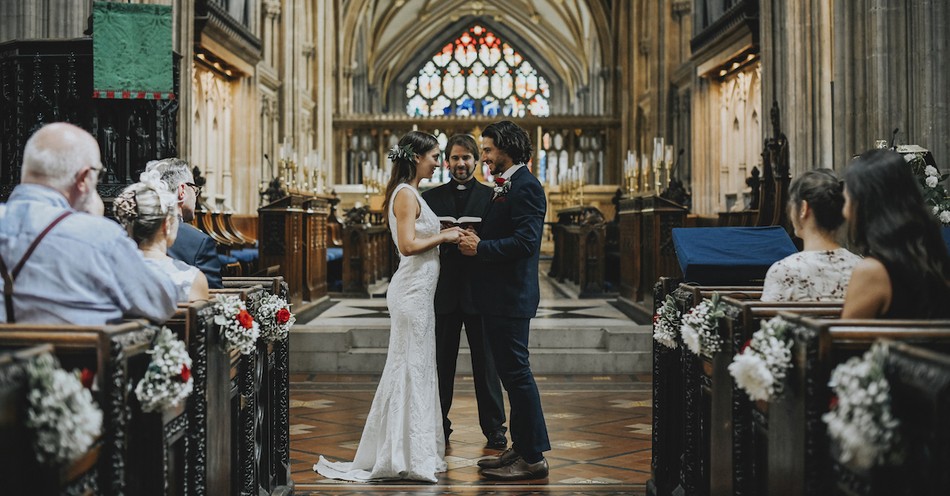I did not vow to stay married to my spouse so long as they make me happy. I also did not vow to stay married to an abusive partner. I vowed to stay married to my husband "for better or for worse" with the understanding of Ephesians 5:25, which says: "Husbands, love your wives, even as Christ also loved the church, and gave himself for it." My husband also vowed to stay married to me "for better or for worse" with the understanding of Ephesians 5:33, which says: "...let every one of you in particular so love his wife even as himself; and the wife see that she reverence (deeply respect) her husband."
A husband who loves his wife so deeply that he would die for her is not an abusive or controlling man. A wife who deeply respects her husband is not a woman who nags or belittles her husband. Wedding vows do not mean much between a couple if they are not carried out within the context of love and respect: My respect for my husband only deepens his love for me, just as my husband's love for me only deepens my respect for him. Love and respect go hand in hand in a healthy and thriving marriage. They are the two key components that keep the relationship alive and on fire throughout the good and the bad. Love and respect keep the marriage strong: "...for better, for worse, for richer, for poorer, in sickness and in health, until death do us part."
Some traditional wedding vows say: "I will love and honor you all the days of my life." Let's take a look at the word "honor." The Macmillian Dictionary describes honor in the following manner: "to show your respect or admiration for someone, especially by giving them a prize or a title, or by praising them publicly." It would seem that honoring my spouse requires me to take action, to do something about the vows that I made. Am I praising my husband publicly? Since marrying my husband, I have had more than one person tell me that he always has "good things" to say about me. Does that mean he is perfect? No. What it means is that he is honoring me by speaking well of me to others.
All the things that might seem outdated about wedding vows are incredibly powerful when they are practiced within the context of love and respect. The problem is that so many of us have seen awful examples or endured unhealthy relationships ourselves that we don't even know what love, respect, and honor look like anymore. When these three things together make up the foundation of my marriage, then the vows I made of "for better or for worse" become much easier to follow. There is one problem, however. My spouse was not dropped out of the sky, and neither was I. I did not marry a perfect person, and I most certainly am not a perfect person. I will not always act in a loving, respectful, and honorable manner towards my spouse, and especially not when I am tired, stressed, or when tragedy strikes. I will revert to old habits and disappoint my spouse in one way or another. I will learn from my mistakes along the way, and I will not let those mistakes define me. I will also not let my husband's mistakes define him.
In the same way, God does not let our mistakes define us: "Therefore if any man be in Christ, he is a new creature: old things are passed away; behold, all things are become new" (2 Cor. 5:17). My wedding vows do not mean that I can treat my spouse however I want and then demand that they respect, love, and honor me. Ephesians 5:25 did not say: husbands, treat your wives however you please and make sure all of your needs are met first. It did say that husbands are to treat their wives in a profoundly loving manner. Ephesians 5:33 did not say: wives, treat your husband's however you please and make sure all of your needs are met first. It did say that wives are to treat their husband's in a deeply respectful manner.
Let's look at one of the passages in the Bible that give us a picture of what love looks like: "Love suffers long and is kind; love does not envy; love does not parade itself, is not puffed up; does not behave rudely, does not seek its own, is not provoked, thinks no evil; does not rejoice in iniquity, but rejoices in the truth; bears all things, believes all things, hopes all things, endures all things. Love never fails." Is it any wonder that 1 Corinthians 13: 4-8 is recited regularly at weddings? Loving, respecting, and honoring my spouse is not something that comes naturally to me. Just like when I became a mom, I thought I would know exactly what to do when they sent me home from the hospital with that tiny little bundle of joy, but I didn't.
Instead, it took work, practice, patience, and putting the needs of another human being before my own. Then I watched my baby grow and thrive. So it is with marriage. It takes work, practice, a lot of patience, and putting my spouse's needs before my own. Not because I feel obligated to do so, but because I feel a deep love towards them in my heart. And no matter how rocky the hard times may be, I simply cannot imagine my life without them.
If you have been or are in a marriage that has shattered your heart--a marriage where your vows were taken out of context and caused you to end up in a situation that was or is far from the loving and respectful manner that God intended, I pray that you can turn your attention with me to Zepheniah 3:17 and see yourself in the light of God's love:
"The Lord your God is in your midst, a mighty one who will save; he will rejoice over you with gladness; he will quiet you by his love; he will exult over you with loud singing."
The first time I read this verse, I cried because I realized that as long as my days are on this earth, the love of God is the love that will always sustain me. Above all else and above anyone else. My wedding vows mean that I love, respect, and honor my spouse in the best way that I know how. I work on loving, respecting, and honoring my spouse more and more as the years go by. He does the same for me, but the truth is that neither of us is capable of the perfect love that only comes from heaven above.
When was the last time someone rejoiced and sang over you because they love you endlessly? Refer back to Zepheniah 3:17 any time you need to, regardless of your situation, because even the happiest of marriages go through turmoil. As John 16:33 says: "In this world you will have trouble. But take heart! I have overcome the world." Remember that even when human love lets you down and trouble and tragedy strike, God's love will never fail you. His example is the one that we are to follow. As the latter part of Hebrews 13:5 says: "I will never leave you nor forsake you."
His vows to you are perfect, and he promises to comfort you (John 14:18) with his eternal and unfailing love, all the days of your life.
Related Resource: Listen to our new, FREE podcast on marriage: Team Us. The best marriages have a teamwork mentality. Find practical, realistic ideas for strengthening your marriage. Listen to an episode here, and then head over to LifeAudio.com to check out all of our episodes:
Photo credit: ©GettyImages/Rawpixel


_638919941832670018.jpg)

%20(5).jpg)
